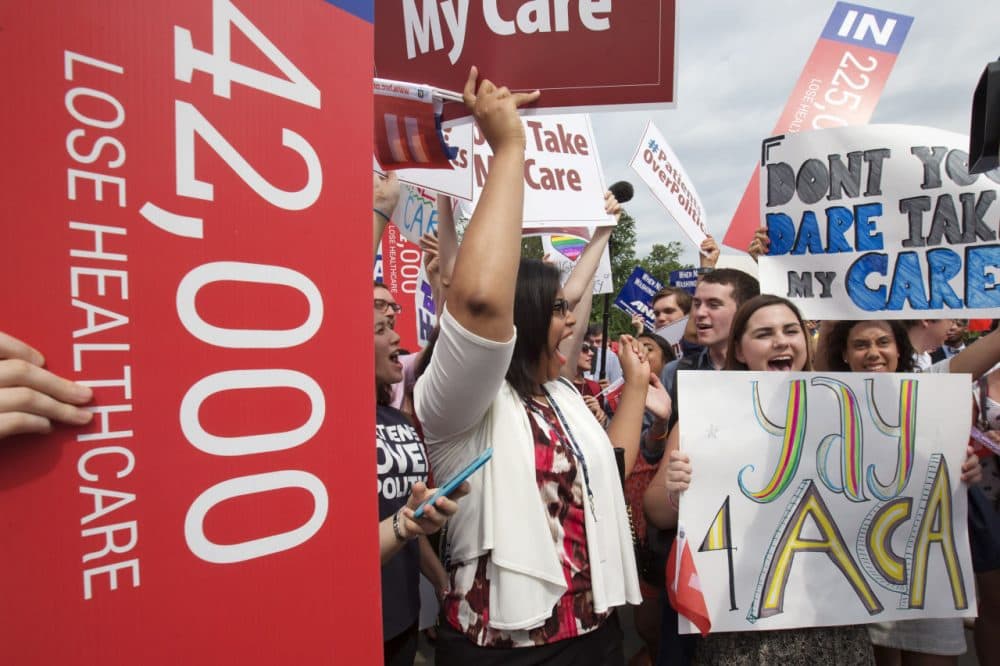Advertisement
Those Who Worked On Mass. Law Cheer As Supreme Court Upholds Obamacare Subsidies
Resume
Obamacare supporters everywhere are celebrating a win from the U.S. Supreme Court. With a 6-3 vote, the court decided Thursday that Americans who buy coverage through health care exchanges run by the federal government can continue to receive subsidies.
None of the 119,962 Massachusetts residents who have health insurance that is subsidized by the government were at risk for losing coverage based on the ruling. That's because the commonwealth has a state-run health insurance shopping website, the Massachusetts Health Connector. The case before the high court only dealt with people who buy insurance through the federal health insurance exchange.
But many in Massachusetts had a close personal or professional interest in this case.
"I am very relieved that affordable care can continue nationwide. It’s made a huge difference in Massachusetts," said Faith Perry, who joined the Greater Boston Interfaith Organization through the Church of the Covenant in Boston.
Back in 2005, Perry was collecting signatures and making calls, trying to persuade state lawmakers to pass the state’s near-universal health coverage law. Perry had two children who were about to graduate from college, "and I was very worried that they would not have health insurance after that," she said.
Perry is one of thousands of residents who celebrated passage of the state law, which Chief Justice John Roberts mentions six times in Thursday's majority opinion. Massachusetts subsidies and other insurance changes, “reduced the uninsured rate in Massachusetts to 2.6 percent, by far the lowest in the nation," writes Roberts.
Josh Archambault at the Pioneer Institute says Roberts overlooks the fact that the uninsured rate was low in Massachusetts before the state or federal coverage laws took affect.
"We only saw a drop of about 4 to 5 percent, whereas in other states they're in much different starting places," Archambault said. "So I'm not sure it's a perfect analogy to be drawn."
But expectations may be shifting.
Rosemarie Day, who was the first chief operating officer at the Health Connector, says that through the federal Affordable Care Act, residents of many states have come to expect that they can get insurance, even if they are already sick or can’t pay the full premium.
"Those are things that are going to become fundamental for America," Day said. "It's been this way in Massachusetts and it's making its way across the country and I’m just thrilled."
At the Massachusetts Hospital Association (MHA), the reaction is more like one long exhale.
"We dodged a bullet on this one," says Tim Gens, MHA's executive vice president. He was prepared to be on a lengthy national strategy call if the court had decided that subsidies for 6.5 million people were illegal.
Gens says state hospitals were worried because they didn’t know what would happen to the entire Affordable Care Act, and all the changes it has triggered, if insurance subsidies collapsed in 34 states named in the lawsuit.
"For a state like Massachusetts that has its challenges but has been working hard collaboratively with so many stakeholders to move in the right direction, it couldn’t have been anything other than bad news to have that disrupted," Gens said.
The Affordable Care Act will still face challenges from the Republican controlled U.S. House and Senate. The so-called Cadillac tax, small business changes and other provisions that will increase the cost of insurance for millions of Americans are still to come. This test of health care reform is not done.
But King v. Burwell may be the end of serious court challenges to the law that uses the Massachusetts experiment as a blueprint.
This post was updated at 5:40 p.m.
This article was originally published on June 25, 2015.
